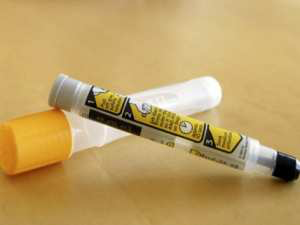
As I tell my students: if you see long lines or high prices, it’s because the government has inserted itself (in regulations or laws) to reduce competition.
The same is true in the current EpiPen debate. Democrats are bemoaning the cost of EpiPens, but not taking responsibility for creating the regulations that created the medical monopoly.
Angry lawmakers and Democratic presidential candidate Hillary Clinton are going to want us to see them as heroes for their efforts to shame pharmaceutical company Mylan into lowering the cost of an allergy treatment for some people.
EpiPens, used to provide injections of epinephrine in cases of severe, potentially life-threatening allergy attacks, have been creeping up in price from $100 to $600 per dose since 2009. This has become a political issue right now (at the height of an election cycle—go figure) partly because of attention by Sen. Amy Klobuchar (D-Minn.), whose daughter uses them. Clinton has waded into the debate and called the price hikes “outrageous, and just the latest example of a company taking advantage of its consumers.”
It would be more accurate to say that the company is taking advantage of the fact that the federal government’s own regulatory scheme has given them a medical monopoly. Clinton wants to cast herself and the government as the cure for this problem. It’s actually the cause in any number of ways.
The Wall Street Journal detailed extensively as Clinton threw herself into the conflict that the Food and Drug Administration (FDA) has made it very difficult for competitors to enter the marketplace and push prices downward. Epinephrine is cheap and EpiPens have been around for decades. Their prices should be trending downward not upward. But the FDA’s complicated (and ambiguous) process of approving other drug delivery systems has kept competitors off the market. And to be clear, there are other companies trying to participate and demonstrate they can provide safe alternatives:
But no company has been able to do so to the FDA’s satisfaction. Last year Sanofi withdrew an EpiPen rival called Auvi-Q that was introduced in 2013, after merely 26 cases in which the device malfunctioned and delivered an inaccurate dose. Though the recall was voluntary and the FDA process is not transparent, such extraordinary actions are never done without agency involvement. This suggests a regulatory motive other than patient safety.
Then in February the FDA rejected Teva’s generic EpiPen application. In June the FDA required a San Diego-based company called Adamis to expand patient trials and reliability studies for still another auto-injector rival.